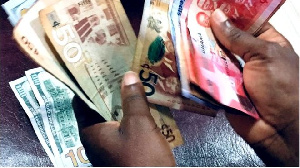In the Republic of Ghana, the sole legal tender is the Ghana Cedi and Ghana Pesewa.
The Foreign Exchange Act of 2006, Act 723, prohibits pricing, advertising, and receipt or payment for goods and services in foreign currency in Ghana.
Consequently, it is imperative to continually assess the strength of the Ghana Cedi relative to foreign major currencies such as the British Pound Sterling, European Euro, and the American Dollar, among others, to facilitate measurement of performance of the Ghanaian economy in the global context.
As at 31st March, 2020, the Cedi-Dollar exchange rate was GH¢5.73 to US$1.00. During this period, President Nana Akufo-Addo of Ghana announced the partial lockdown and border closures across the country.
The expectation was a stability in the Ghana Cedi relative to foreign major currencies such as the American Dollar. However, as at 3rd July, 2020, the Cedi-Dollar exchange rate hovered around GH¢5.78 to US$1.00.
Contrary to prior expectations, the nation experienced a sharp fall in value or depreciation of the Ghana Cedi (0.87%) relative to the American Dollar during the period.
The significant question is, what are some of the factors that might have accounted for a sharp rise in the total amount of Ghana Cedis required to obtain US$1.00 at a time when the borders are closed with economic activities largely concentrated within the Ghanaian economy?
A brief research on current developments in the exchange rate market amid the COVID-19 pandemic revealed the Ghana Cedi recorded its all-time best performance against the United States Dollar in the first half of 2020 than the first six months of any year since 2014.
Available data on the Ghana Cedi performance as displayed in Figure 1 shows first six months’ depreciation of 26.71% for 2014; 26.2% for 2015; 3.26% for 2016; 3.73% for 2017; 2.37% for 2018; 8.35% for 2019; and 2.36% for 2020.
Depreciation so far in the current financial year is the lowest since 2014; this is particularly remarkable in the context of the COVID-19 pandemic.
In fact, currencies of many developing and emerging market economies have depreciated sharply against the American Dollar following the global slowdown that has resulted from the COVID-19 pandemic.
Data in Figure 2 reveal as at June 2020, the Brazilian Real had depreciated against the United States Dollar by 31.6%; the Zambian Kwacha had depreciated by 28.2%, South African Rand by 21.4%, Argentine Peso by 17.9%, Mexican Peso by 17.4%, Russian Rouble by 16%, Turkish Lira by 15.4%, and the Mauritian Rupee by 9.3%. Notwithstanding the devastating effect of the pandemic on the Ghanaian economy, the Ghana Cedi depreciated by 2.36%.
This compared favorably with the performance of the foregoing currencies during the period; and affirmed the ingenuity of the managers of the Ghanaian economy, especially the Bank of Ghana.
Figure 1: Ghana Cedi performance in first half of 2014 through 2020

Border closures and limited imports were part of the collective strategies adapted and implemented by each of the aforementioned economies to contain and minimise further spread of COVID-19.
Yet, their respective currencies depreciated sharply against the American Dollar in double digits. Thus, in the midst of COVID-19, one cannot attribute the strong performance of the Ghana Cedi mainly to limited imports.
Rather, prudent economic management strategy, strong and steady economic fundamentals such as controlled inflation, policy and interest rates, and high gross international reserves, among others, account for relative stability of the Ghana Cedi.
Current happenings are a testament to robust fundamentals of the Ghanaian economy prior to the COVID-19 outbreak. Strong fundamentals allow an economy to absorb both expected and unexpected shocks better; and to chart the path of economic growth stronger.
Between 2017 and 2020, the Ghana Cedi has depreciated by an average of 8.7% compared to 18% recorded between 2013 and 2016. The foregoing implies all else held constant, if the Ghana Cedi had continued depreciating at an average rate of 18% annually since 2017, as was the case under the previous administration, today the exchange rate would have been about GH¢7.60 to US$1.00 or higher, given the socio-economic effect of the pandemic.
It is worth-emphasising the full effects of the COVID-19 pandemic are yet to be felt. However, fiscal deficit for 2020 is likely to increase as government’s total expenditure surges and revenues thump as a result of the pandemic. Total expenditure has increased to deal with the COVID-19 outbreak.
This financial development is not peculiar to Ghana; even advanced and financially-endowed economies such as the United Kingdom, United States, China, Japan, Germany, and others, are engaging in deficit financing to cope with the pandemic.
In May, China made a decision to abandon growth target for 2020 after several attempts to revive the economy through well-thought-out strategies fell through.
Rather, she has decided to focus essentially on increasing private sector investment, consumption and export to drive national growth in the current financial year.

Total stimulus packages announced by the Chinese government as at May 2020 were in excess of £410 billion while total packages announced by the United Kingdom (UK) government as at July this year amounted to £190 billion.
Similar respective packages announced by Japan, New Zealand and Germany in May this year were £870 billion, £26 billion and €130 billion. Countries such as Canada, France and Australia have adapted iterative measures.
That is, the level of expenditure is contingent on the evolution of the COVID-19 pandemic (Institute for Government, 2020). The socio-economic transformation introduced by COVID-19 is lucid; it implies the year 2020 is about saving lives and sustaining livelihoods, and not about clamouring for lower fiscal deficits and debts.
Source: Ebenezer Ashley, Contributor
 Home Of Ghana News Ghana News, Entertainment And More
Home Of Ghana News Ghana News, Entertainment And More





